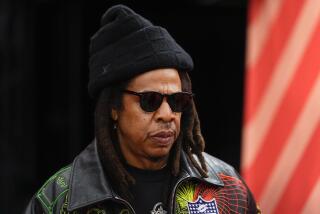Youngsters Listening to the Sounds of a Simpler Time
When I hear my 11-year-old daughter, Taylor, playing her favorite music on her “box,” I don’t cringe the way my parents used to when I was a kid filling the house with rock ‘n’ roll. Not only are her favorite rock stars similar to the ones I used to love, but in many cases they are the very same rock stars. Play it again, Sam . . . Cooke. Play it again, Animals, Monkees and Buddy Holly and the Crickets. Play it again, Beach Boys and Castaways, Supremes and Temptations.
It is as though the entire younger generation had raced back to the late 1950s and early 1960s, to the simpler music of a simpler time, a time before John F. Kennedy was killed, a time before Vietnam, a time before the sexual revolution, a time before AIDS. But most of all a time before the drug culture.
“Pop culture has taken a step away from hard-edged drug culture,” says Tom Mount, who produced the hit movie “Bull Durham,” which features the very first rock ‘n’ roll classic, “Rock Around the Clock,” originally released in 1955. “You can see it in the comic books kids read, the kind of movies they see, the music they listen to.” Especially the music.
And the polls bear out what the music is telling us. In a University of Michigan survey, about a third of the 1987 high school graduating class said they had gotten high on marijuana or hashish in their senior year; in 1979, more than half the class admitted to getting stoned.
The same fate is now befalling drugs that befell cigarettes years ago. Remember Humphrey Bogart smoking in the movies? Remember Edward R. Murrow lighting up on TV? They’re gone now. People still smoke (although fewer and fewer) but not very often on movie or television screens. Many people still take drugs (although the number is slowly decreasing), but a new generation seems to be collectively turning away from “high” culture and druggy music.
“I like most old stuff,” says Zoe Muskovitz, an 11-year-old who attends Sidwell Friends School. “I like old stuff because a lot of it has really good lyrics. The lyrics today are stinking.”
Drug music never relied heavily on lyrics because the musicians were sometimes too high to sing them and the audience too stoned to understand them. Did you ever try to listen to the words in an AC/DC song? You can’t hear them and if you could, they wouldn’t make any sense.
This back-to-the-future phenomenon seems to have begun appropriately enough with “Back to the Future.” In that 1985 movie, Michael J. Fox rides a DeLorean back to 1955, where he picks up a guitar and plays a song called “Johnny B. Goode.” In the story, a musician named Marvin Berry hears Fox play and calls up his cousin Chuck and tells him, “You know that new sound you’ve been looking for? Listen to this.” So a boy from the 1980s helps create a hit in the 1950s, so it is only fair that in return the ‘50s should be supplying the ‘80s with hits. Is that clear?
The “Back to the Future” sound track album, which qualified as a gold record with over a half million in sales, contained not only “Johnny B. Goode” (1958) but also “Night Train” (1960) and “Earth Angel” (1955).
Then in 1986 came the nostalgic movie “Stand By Me,” about a boy growing up as the ‘50s blended into the ‘60s. This picture’s sound track stood by a lot of old standbys, beginning with the song “Stand By Me” as originally done by Ben E. King in 1963. It also contained the Silhouettes’ “Get a Job” (1958) with a message as contemporary in the materialistic ‘80s as it was in the ‘50s. And the Bobbettes’ “Mr. Lee” (1957). And the Chordettes’ “Lollipop” (1958), which is as hard to get out of your head as gum is to get out of your hair. This sound-track album also went gold with more than 500,000 records sold.
And then in 1987 came the huge one, the real Big Bopper, a movie called “Dirty Dancing,” which begins with these words: “That was the summer of 1963. That was before President Kennedy was shot. Before the Beatles came. When I couldn’t wait to join the Peace Corps.” So the day President Kennedy died becomes the day idealism died and the world and music got complicated.
More to Read
The biggest entertainment stories
Get our big stories about Hollywood, film, television, music, arts, culture and more right in your inbox as soon as they publish.
You may occasionally receive promotional content from the Los Angeles Times.






